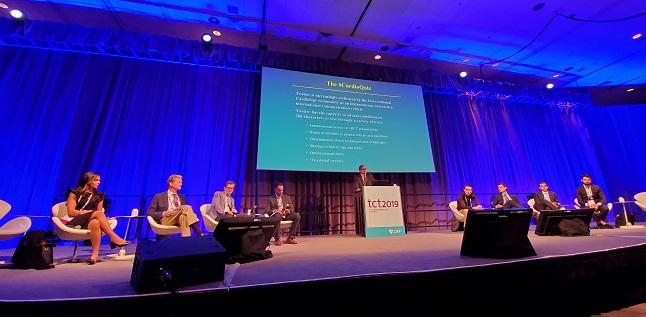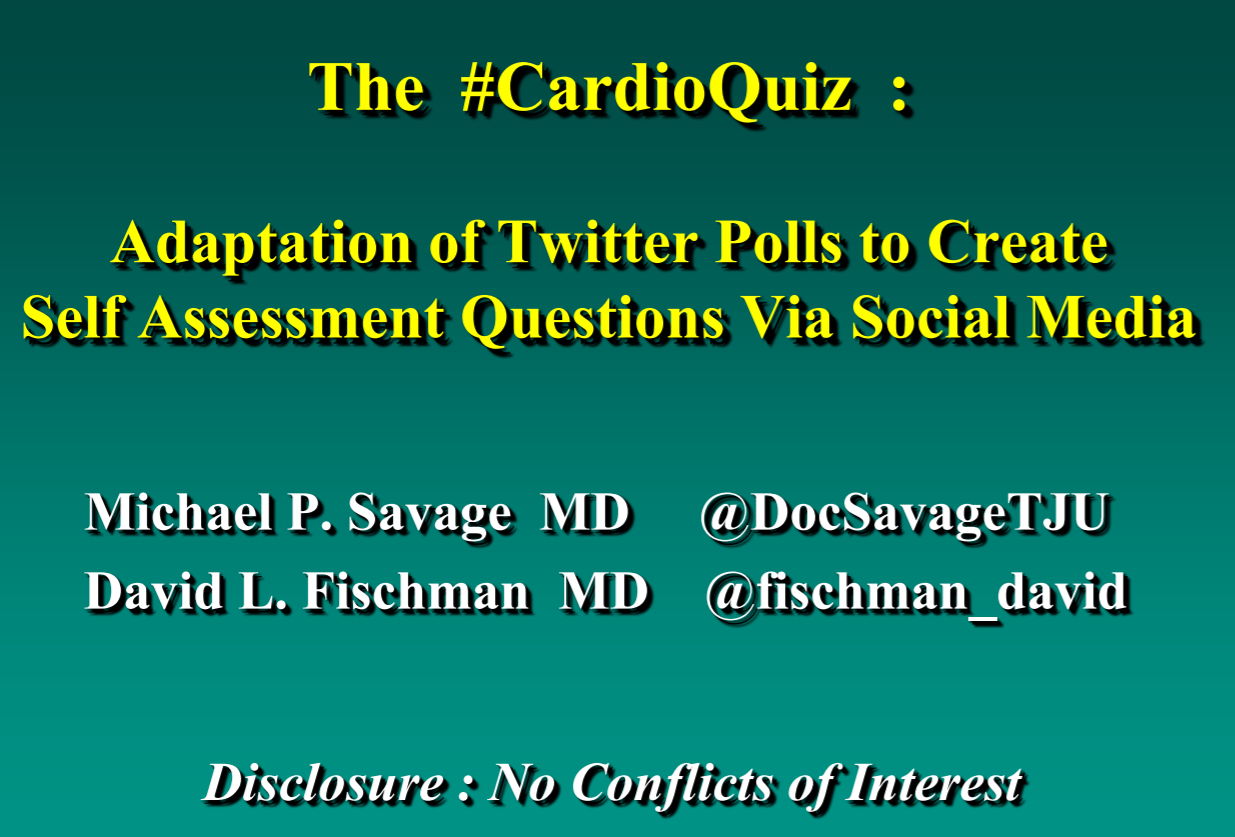#CardioQuiz Engages Cardiology Learners Through Twitter Polls, Discussion
The anonymity of answering polls eliminates some of the vulnerability physicians face when learning on social media.

SAN FRANCISCO, CA—Cardiologists are now using the polling feature on Twitter to create self-assessment educational tools that have the added benefit of interactive discussion beyond what can be found in a textbook or a mock exam.
For the last year or so, Michael Savage, MD (Jefferson University Hospital, Philadelphia, PA), has helped spearhead the #CardioQuiz movement on Twitter, and he presented on the topic last weekend at TCT 2019. The social media platform allows users to create polls—questions with up to four answers—that can run for a limited period of time and are answered anonymously. The results are calculated in real time, with the final voting percentages displayed at the completion of the poll.
“#CardioQuiz utilizes this polling format to provide the self-assessment exam-like question,” Savage explained. “In a traditional poll, the respondents are voting to select the choice corresponding to their own opinion. In contrast, the #CardioQuiz is designed to test the respondents clinical fund of knowledge as the challenge is to select the one correct answer. What I think makes this particularly rich is the interactive Twitter feed where there are discussions to amplify the teaching points related to the quiz.”
Savage gave an example of a poll from last year tagged #CardioQuiz that he posed to cardiology fellows regarding what the next step should be for a 70-year-old woman with dyspnea on exertion, a fixed inferior defect on nuclear testing, and body mass index > 35. The tweet showed angiographic images and a multiple choice answer that included, as acronyms, four options: optical coherence tomography or intravascular ultrasound; fractional flow reserve, instantaneous wave-free ratio, or coronary flow reserve; multipurpose or Amplatz right catheter; and radial band (done).
#CardioQuiz #ACCFIT 70yo👵, DOE,Fixed inf. defect,BMI>35. #RadialFirst LCA & RCA angios⤵️ What’s the next step? See Poll in Reply for options. @bcostelloMD @majazayeri @chadialraies @DocAbbas @walfay_md @DocMehta407 @noshreza @MusaSharkawi @NadeenFaza @JelaniAini @FahdWaqar pic.twitter.com/zTabSi6MJY
— Michael Savage (@DocSavageTJU) September 12, 2018
“I was interested and surprised that there were a lot of wrong answers to the quiz as it was going on in real time,” he said, adding that this provides justification for putting the question out as a worthwhile learning tool in the first place. After 2 days, the poll garnered 264 votes, including 54% correct guesses, namely, to continue investigation using either a multipurpose or Amplatz right catheter.
“Of course, it's important not only to reveal the answer but to explain and educate once the answer is revealed,” Savage said. He continued adding to the thread with discussion of the case following the poll’s conclusion.
“The discussion thread of the tweet serves as a group ‘Tweetorial,’ which makes it entertaining as well as educational at the same time,” he told TCTMD. “I particularly enjoy the interactions with the fellows-in-training, which I consider to be the most important target audience.”
Cataloguing Information
Following the presentation, Sunil Rao, MD (Duke Clinical Research Institute, Durham, NC), who chaired the session on social media and digital health, commented that “one of the issues with Twitter or any social media is just there’s a tremendous amount of information coming in. It gets caught up with tweets from all kinds of things that may be unrelated to cardiology.” #CardioQuiz has helped to “catalog” some of that, he added, asking how often new quizzes are posted.
“We really haven’t done it in an organized way,” Savage replied. “It's really just as cases come up that we think would be a value to share, particularly at the level of trainees.”
David Fischman, MD (Jefferson University Hospital, Philadelphia, PA), who served as a panelist and has also contributed to #CardioQuiz, suggested that these could be posted either on a weekly basis or potentially through an organization to give them more credibility.
“I almost wonder if #CardioQuiz should start a handle and tweet from that account,” Rao said. “It’s one way to . . . not regulate, but at least [to] serve as a clearing house for that content.”
Specifically, “one of the challenges with this is that if people start using this #CardioQuiz and posting questions, they may not actually know what the right answer is and they might post something where the answer is not listed or incorrect,” he clarified.
Panelist Sheila Sahni, MD (Garden State Heart Center, Clark, NJ), commented that “when you launch a hashtag you can give it some form of regulation. This nice thing about presenting it here at TCT is now everyone who's in the audience who wants to see what's been catalogued can search for this hashtag just as they would any other hashtag.”
She encouraged Savage and Fischman to create a title page or brochure that could be posted on Twitter and set ground rules for how to use the hashtag #CardioQuiz. “There's no way to regulate Twitter,” Sahni acknowledged. But “there’s a vulnerability in social media, and, especially as physicians, we think about our administrators or our patients who are looking at us on Twitter because it's a public space. It’s nice that a quiz takes away a little bit of that ‘Did I know the answer? Did I not?’ You can answer along and you don't feel as exposed but you're learning.”
Savage agreed. “I think it’s important that it’s an anonymous vote,” he said. “It's not like your vote is broadcast. If you respond [in the discussion], then of course you're identified, but the voting is anonymous, which takes a little bit of the fear out of it.”
Something else to note is that even if someone posts a wrong answer on #CardioQuiz or another similar platform, ultimately “social media actually empowers endorsement of the right answer,” Savage concluded. “I’m sure we’ve all done mock exam questions or even real exam questions for board certification and we disagreed with what the right answer was. One of the nice things was you have the feedback and comments of a lot of really experienced people. In a way, that kind of self-regulation ensures that you have the right answer even if the poster had the wrong answer.”
Savage said told TCTMD he is in talks with cardiovascular societies to potentially collaborate on publishing more regular #CardioQuiz polls through their platforms.
Yael L. Maxwell is Senior Medical Journalist for TCTMD and Section Editor of TCTMD's Fellows Forum. She served as the inaugural…
Read Full BioSources
Savage MP. The #CardioQuiz: adaptation of Twitter polls to create self assessment questions via social media. Presented at: TCT 2019. September 28, 2019. San Francisco, CA.
Disclosures
- Savage reports no relevant conflicts of interest.



Comments